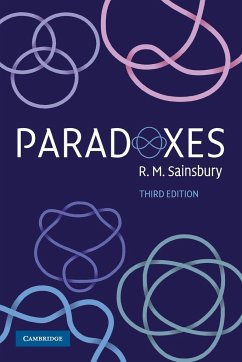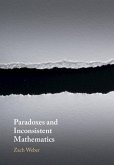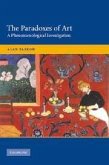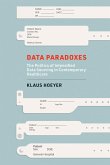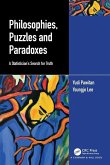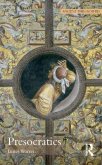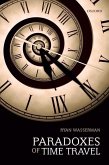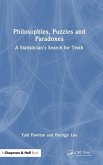- Broschiertes Buch
- Merkliste
- Auf die Merkliste
- Bewerten Bewerten
- Teilen
- Produkt teilen
- Produkterinnerung
- Produkterinnerung
The expanded and revised third edition of this intriguing book considers a range of knotty paradoxes including paradoxes about morals, paradoxes about belief, and hardest of all, paradoxes about truth. It is not only an explanation of paradoxes but also an excellent introduction to philosophical thinking.
Andere Kunden interessierten sich auch für
![Paradoxes and Inconsistent Mathematics Paradoxes and Inconsistent Mathematics]() Zach Weber (New Zealand University of Otago)Paradoxes and Inconsistent Mathematics36,99 €
Zach Weber (New Zealand University of Otago)Paradoxes and Inconsistent Mathematics36,99 €![The Paradoxes of Art The Paradoxes of Art]() Alan Paskow (Maryland St Mary's College)The Paradoxes of Art106,99 €
Alan Paskow (Maryland St Mary's College)The Paradoxes of Art106,99 €![Data Paradoxes Data Paradoxes]() Klaus HoeyerData Paradoxes60,99 €
Klaus HoeyerData Paradoxes60,99 €![Philosophies, Puzzles and Paradoxes Philosophies, Puzzles and Paradoxes]() Yudi PawitanPhilosophies, Puzzles and Paradoxes25,99 €
Yudi PawitanPhilosophies, Puzzles and Paradoxes25,99 €![Presocratics Presocratics]() James WarrenPresocratics42,99 €
James WarrenPresocratics42,99 €![Paradoxes of Time Travel Paradoxes of Time Travel]() Ryan Wasserman (Western Washington University)Paradoxes of Time Travel48,99 €
Ryan Wasserman (Western Washington University)Paradoxes of Time Travel48,99 €![Philosophies, Puzzles and Paradoxes Philosophies, Puzzles and Paradoxes]() Yudi PawitanPhilosophies, Puzzles and Paradoxes147,99 €
Yudi PawitanPhilosophies, Puzzles and Paradoxes147,99 €-
-
-
The expanded and revised third edition of this intriguing book considers a range of knotty paradoxes including paradoxes about morals, paradoxes about belief, and hardest of all, paradoxes about truth. It is not only an explanation of paradoxes but also an excellent introduction to philosophical thinking.
Hinweis: Dieser Artikel kann nur an eine deutsche Lieferadresse ausgeliefert werden.
Hinweis: Dieser Artikel kann nur an eine deutsche Lieferadresse ausgeliefert werden.
Produktdetails
- Produktdetails
- Verlag: Cambridge University Press
- 3 Revised edition
- Seitenzahl: 192
- Erscheinungstermin: 18. April 2016
- Englisch
- Abmessung: 229mm x 152mm x 11mm
- Gewicht: 300g
- ISBN-13: 9780521720793
- ISBN-10: 0521720796
- Artikelnr.: 24702580
- Herstellerkennzeichnung
- Libri GmbH
- Europaallee 1
- 36244 Bad Hersfeld
- gpsr@libri.de
- Verlag: Cambridge University Press
- 3 Revised edition
- Seitenzahl: 192
- Erscheinungstermin: 18. April 2016
- Englisch
- Abmessung: 229mm x 152mm x 11mm
- Gewicht: 300g
- ISBN-13: 9780521720793
- ISBN-10: 0521720796
- Artikelnr.: 24702580
- Herstellerkennzeichnung
- Libri GmbH
- Europaallee 1
- 36244 Bad Hersfeld
- gpsr@libri.de
R. M. Sainsbury is a Professor in the Department of Philosophy, University of Texas, Austin. He also teaches in the Department of Philosophy, King's College, London. He was editor of the journal Mind for a decade from 1990 and his many publications include Reference without Referents (2005, 2007) and Logical Forms, 2nd edition (2000).
Foreword to third edition
Introduction
Suggested reading
1. Zeno's paradoxes: space, time, and motion
1.1 Introduction
1.2 Space
1.3 The Racetrack
1.4 The Racetrack again
1.5 Achilles and the Tortoise
1.6 The Arrow
Suggested reading
2. Moral paradoxes
2.1 Crime reduction
2.2 Mixed blessings
2.3 Not being sorry
2.4 Moral dilemmas
Suggested reading
3. Vagueness: the paradox of the heap
3.1 Sorites paradoxes: preliminaries
3.2 Sorites paradoxes: some options
3.3 Accepting the conclusion: Unger's view
3.4 Rejecting the premises: the epistemic theory
3.5 Rejecting the premises: supervaluations
3.6 Rejecting the reasoning: degrees of truth
3.7 Vague objects?
Suggested reading
4. Acting rationally
4.1 Newcomb's paradox
4.2 The Prisoner's Dilemma
Suggested reading
5. Believing rationally
5.1 Paradoxes of confirmation
5.1.1 Background
5.1.2 The paradox of the Ravens
5.1.3 'Grue'
5.2 The Unexpected Examination
5.3 Revising the Unexpected Examination
5.4 The Knower
Suggested reading
6. Classes and truth
6.1 Russell's paradox
6.2 The Liar: semantic defects
6.3 Grounding and truth
6.4 The Strengthened Liar
6.5 Levels
6.6 Self-reference
6.7 Indexicality
6.8 Indexical circularity
6.9 Comparison: how similar are Russell's paradox and the Liar?
Suggested reading
7. Are any contradictions acceptable?
7.1 Contradictions entail everything
7.2 A sentence which is both true and false could have no intelligible content
7.3 Three dualities
7.4 Negation
7.5 Falsehood and untruth
Suggested reading
Appendix I. Some more paradoxes
Appendix II. Remarks on some text questions and appended paradoxes
Bibliography
Index.
Introduction
Suggested reading
1. Zeno's paradoxes: space, time, and motion
1.1 Introduction
1.2 Space
1.3 The Racetrack
1.4 The Racetrack again
1.5 Achilles and the Tortoise
1.6 The Arrow
Suggested reading
2. Moral paradoxes
2.1 Crime reduction
2.2 Mixed blessings
2.3 Not being sorry
2.4 Moral dilemmas
Suggested reading
3. Vagueness: the paradox of the heap
3.1 Sorites paradoxes: preliminaries
3.2 Sorites paradoxes: some options
3.3 Accepting the conclusion: Unger's view
3.4 Rejecting the premises: the epistemic theory
3.5 Rejecting the premises: supervaluations
3.6 Rejecting the reasoning: degrees of truth
3.7 Vague objects?
Suggested reading
4. Acting rationally
4.1 Newcomb's paradox
4.2 The Prisoner's Dilemma
Suggested reading
5. Believing rationally
5.1 Paradoxes of confirmation
5.1.1 Background
5.1.2 The paradox of the Ravens
5.1.3 'Grue'
5.2 The Unexpected Examination
5.3 Revising the Unexpected Examination
5.4 The Knower
Suggested reading
6. Classes and truth
6.1 Russell's paradox
6.2 The Liar: semantic defects
6.3 Grounding and truth
6.4 The Strengthened Liar
6.5 Levels
6.6 Self-reference
6.7 Indexicality
6.8 Indexical circularity
6.9 Comparison: how similar are Russell's paradox and the Liar?
Suggested reading
7. Are any contradictions acceptable?
7.1 Contradictions entail everything
7.2 A sentence which is both true and false could have no intelligible content
7.3 Three dualities
7.4 Negation
7.5 Falsehood and untruth
Suggested reading
Appendix I. Some more paradoxes
Appendix II. Remarks on some text questions and appended paradoxes
Bibliography
Index.
Foreword to third edition
Introduction
Suggested reading
1. Zeno's paradoxes: space, time, and motion
1.1 Introduction
1.2 Space
1.3 The Racetrack
1.4 The Racetrack again
1.5 Achilles and the Tortoise
1.6 The Arrow
Suggested reading
2. Moral paradoxes
2.1 Crime reduction
2.2 Mixed blessings
2.3 Not being sorry
2.4 Moral dilemmas
Suggested reading
3. Vagueness: the paradox of the heap
3.1 Sorites paradoxes: preliminaries
3.2 Sorites paradoxes: some options
3.3 Accepting the conclusion: Unger's view
3.4 Rejecting the premises: the epistemic theory
3.5 Rejecting the premises: supervaluations
3.6 Rejecting the reasoning: degrees of truth
3.7 Vague objects?
Suggested reading
4. Acting rationally
4.1 Newcomb's paradox
4.2 The Prisoner's Dilemma
Suggested reading
5. Believing rationally
5.1 Paradoxes of confirmation
5.1.1 Background
5.1.2 The paradox of the Ravens
5.1.3 'Grue'
5.2 The Unexpected Examination
5.3 Revising the Unexpected Examination
5.4 The Knower
Suggested reading
6. Classes and truth
6.1 Russell's paradox
6.2 The Liar: semantic defects
6.3 Grounding and truth
6.4 The Strengthened Liar
6.5 Levels
6.6 Self-reference
6.7 Indexicality
6.8 Indexical circularity
6.9 Comparison: how similar are Russell's paradox and the Liar?
Suggested reading
7. Are any contradictions acceptable?
7.1 Contradictions entail everything
7.2 A sentence which is both true and false could have no intelligible content
7.3 Three dualities
7.4 Negation
7.5 Falsehood and untruth
Suggested reading
Appendix I. Some more paradoxes
Appendix II. Remarks on some text questions and appended paradoxes
Bibliography
Index.
Introduction
Suggested reading
1. Zeno's paradoxes: space, time, and motion
1.1 Introduction
1.2 Space
1.3 The Racetrack
1.4 The Racetrack again
1.5 Achilles and the Tortoise
1.6 The Arrow
Suggested reading
2. Moral paradoxes
2.1 Crime reduction
2.2 Mixed blessings
2.3 Not being sorry
2.4 Moral dilemmas
Suggested reading
3. Vagueness: the paradox of the heap
3.1 Sorites paradoxes: preliminaries
3.2 Sorites paradoxes: some options
3.3 Accepting the conclusion: Unger's view
3.4 Rejecting the premises: the epistemic theory
3.5 Rejecting the premises: supervaluations
3.6 Rejecting the reasoning: degrees of truth
3.7 Vague objects?
Suggested reading
4. Acting rationally
4.1 Newcomb's paradox
4.2 The Prisoner's Dilemma
Suggested reading
5. Believing rationally
5.1 Paradoxes of confirmation
5.1.1 Background
5.1.2 The paradox of the Ravens
5.1.3 'Grue'
5.2 The Unexpected Examination
5.3 Revising the Unexpected Examination
5.4 The Knower
Suggested reading
6. Classes and truth
6.1 Russell's paradox
6.2 The Liar: semantic defects
6.3 Grounding and truth
6.4 The Strengthened Liar
6.5 Levels
6.6 Self-reference
6.7 Indexicality
6.8 Indexical circularity
6.9 Comparison: how similar are Russell's paradox and the Liar?
Suggested reading
7. Are any contradictions acceptable?
7.1 Contradictions entail everything
7.2 A sentence which is both true and false could have no intelligible content
7.3 Three dualities
7.4 Negation
7.5 Falsehood and untruth
Suggested reading
Appendix I. Some more paradoxes
Appendix II. Remarks on some text questions and appended paradoxes
Bibliography
Index.

